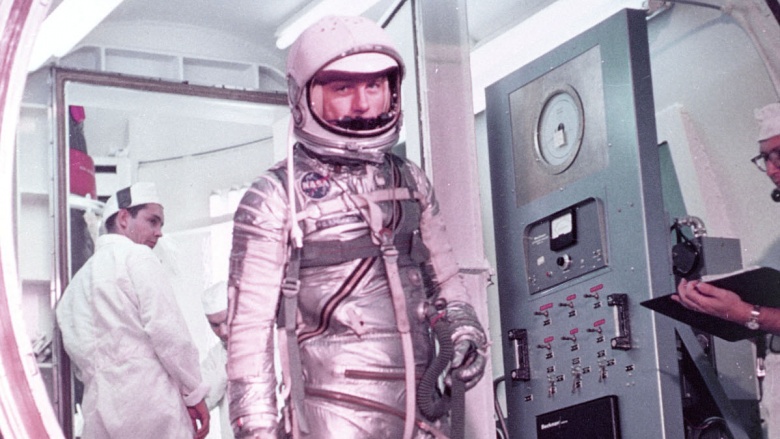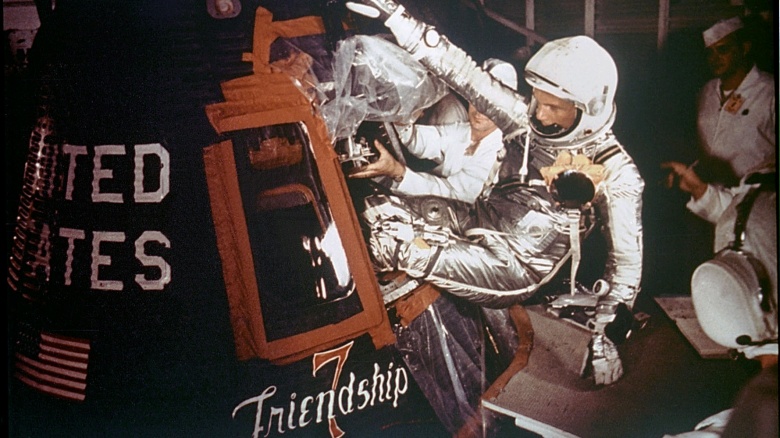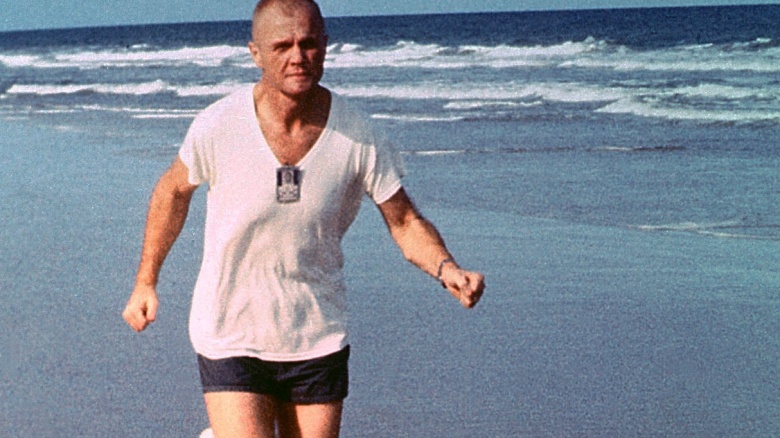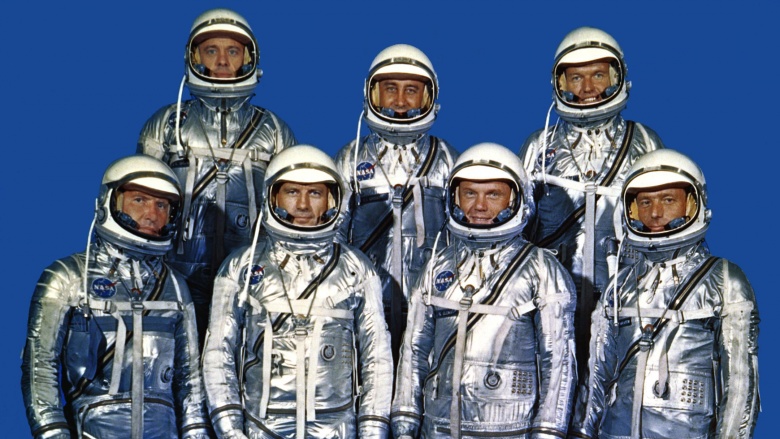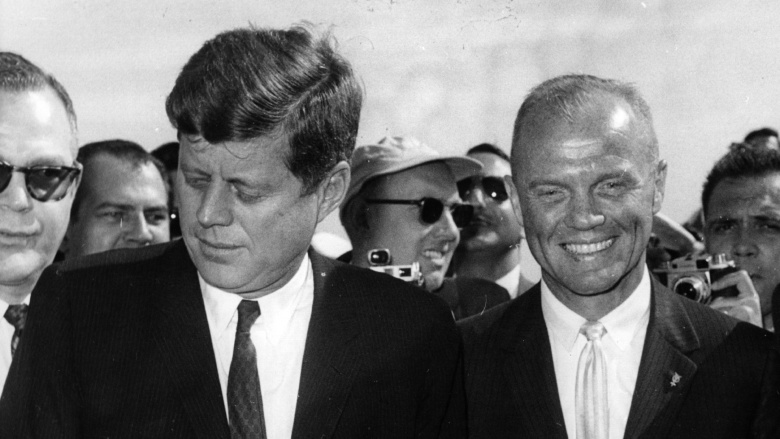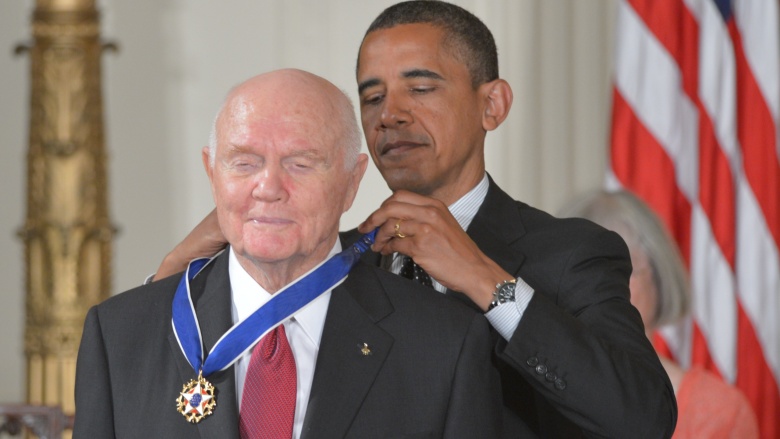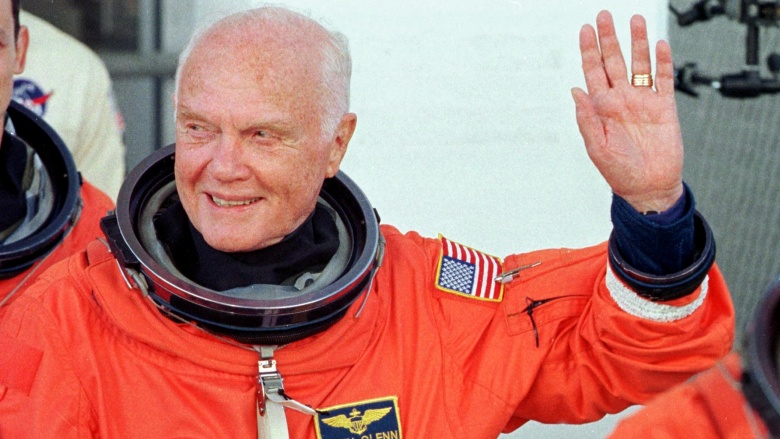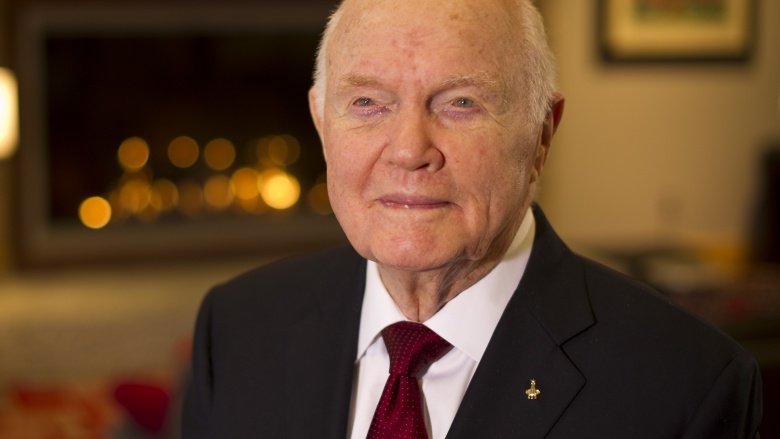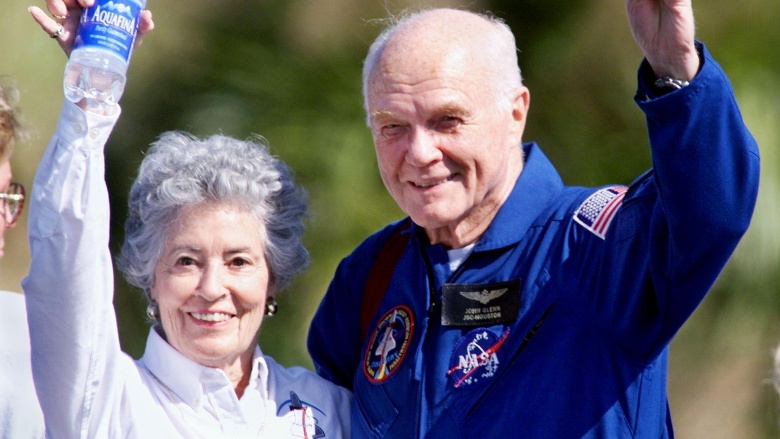Things You Didn't Know About John Glenn
2016 has been one for the ages, as far as celebrity deaths go, but when it comes to the death of John Glenn, the loss is about so much more than just a well-known name and face. The famed NASA astronaut, who earned eternal acclaim in 1962 for becoming the first American to orbit Earth, was also a war hero, an ambitious politician, and a two-time space travel record-holder as well. Yet somehow, his full life story is even more fascinating than most people probably realize:
An Ohioan for life
John Herschel Glenn, Jr. was born, raised, educated, and married in Ohio, so perhaps it's not surprising that, even though he literally (like, actual literally) traveled around the globe in his line of work, he wound up spending much of his later life in service of the Buckeye State. He and his high school sweetheart-turned wife of 73 years, Annie, were both from Ohio, and each turned to public service for the state after he completed the first leg of his space race journey.
Glenn served as the state's Senator for a quarter century, and his wife was a distinguished professor of pathology at Ohio State University. After his death at the age of 95 on December 8, 2016, Ohio's Governor John Kasich said in a statement, "John Glenn is, and always will be, Ohio's ultimate hometown hero."
He wasn't the first in space, but one of the most important
Glenn was not the first human being in space (that would be Russian Yuri Gagarin), nor was he even the first American to leave Earth's atmosphere and get a taste of the Great Beyond (that honor belongs to Alan Shepard). In fact, Glenn was but the fifth person to travel into space, and the third American at that. His claim to fame, however, came from not just being the first American to actually orbit the planet, and his mission success came at a critical juncture in the nation's political history.
Glenn was the third astronaut to participate in NASA's Mercury space program, and his trip on the Friendship 7 vessel resulted in three laps around Big Blue on February 20, 1962, before he safely returned and restored America's hopes of winning the Cold War space race against the U.S.S.R. which, at the time, was ahead of the manned mission game. This is why he's been awarded many a medal for his service to the United States' military and space programs, his most recent being the Medal of Freedom, bestowed upon him by President Obama in 2012.
According to NASA, the mission wasn't devoid of its complications; the automatic controls of the vessel went out during his first orbit, and Glenn had to manually control it throughout the latter two orbits and his reentry into Earth's atmosphere, which he felt amply prepared to do thanks to his training, both in the aeronautics organization and in prior former duties as a military man.
As Obama said in a statement reflecting upon Glenn's death, "When John Glenn blasted off from Cape Canaveral atop an Atlas rocket in 1962, he lifted the hopes of a nation, and when his Friendship 7 spacecraft splashed down a few hours later, the first American to orbit the Earth reminded us that with courage and a spirit of discovery there's no limit to the heights we can reach together."
His military career on Earth
Before he would ever have the chance to relish in the view of space and boast about feats like "Zero-G and I feel fine," Glenn suited up as another kind of pilot altogether. Glenn served as a Colonel in the Marines, and was a decorated combat pilot in World War II and the Korean War for nearly 150 missions. Glenn even earned the family-friendly nickname "Old Magnet Ass" for being able to keep his planes afloat, even after they'd been struck by swarms of enemy bullets.
It was his next big aviation adventure that would really set him on an out-of-this-world career trajectory. On July 16, 1957, he flew the first supersonic transcontinental flight across the United States, jetting from California to New York in less than three-and-a-half hours on behalf of "Project Bullet." When he passed by his hometown of New Concord, Ohio at his scheduled time, the sonic boom that followed from his flyover resulted in his family's neighbor reportedly yelling, "Johnny dropped a bomb!" Setting the record for speediest transcontinental flight would help put Glenn on the radar for future space travel mission opportunities.
Glenn's issues with women astronauts
Although Glenn's personal and professional record is a marvel of achievement and honor, there's one part of his history that might offend modern sensibilities about the ability of women to accomplish the same things as men.
When NASA was first piecing together its space program, a group of women called the Mercury 13 (a riff on the Mercury Seven, which was the group of Glenn and six other men who were chosen) were evaluated for their potential ability to participate in astronaut activities. Glenn was among those who spoke, on behalf of NASA, for a Congressional hearing on the matter and maintained that women should not be allowed to become astronauts, because of a technicality that required astronauts to have been jet pilots, which women were not allowed to do.
Maddeningly enough for the women involved, Glenn himself would've been prohibited from becoming a Mercury space traveller if NASA went strictly by the books in other regard (since he didn't finish his education at Muskingum University before joining, and only received his degree after completing his orbit mission and having certain graduation requirements waived by the school). However, he ignored that bit of hypocrisy and, in 1962, reportedly testified, "It is just a fact. The men go off and fight the wars and fly the airplanes and come back and design and build and test them. The fact that women are not in this field is a fact of of our social order."
It took 16 years before NASA began training women astronauts. This is not at all to say Glenn wasn't a legendary astronaut and man, but a reminder that even the greatest of people are flawed and imperfect.
John Glenn and the Kennedys
After becoming a national hero for his space conquest, Glenn was introduced (and then came into close favor) with President John F. Kennedy and his brother, Robert F. Kennedy. In fact, it was RFK who initially suggested Glenn consider a career in politics in his home state of Ohio, and JFK reportedly even instructed NASA not to include his new, close, personal buddy Glenn on any life-threatening missions again, so as to encourage the next phase of his career, a decision which Glenn did not know about at the time.
Some have speculated that if Glenn had a chance to man a moon mission, he wouldn't have retired to pursue political interests as early as he did (such as working for RC Cola, though he was on the Board of Directors and didn't endorse the stuff, which sadly meant we never got a tagline like, "I've been to space and orbited the globe, but nothing is more out of this world than the great taste of RC Cola!")
Although his original bid for the Senate had to be withdrawn after a difficult head injury resulting from an accidental fall during his first campaign, Glenn remained active in RFK's campaign for Presidency, and was present at the hotel where Kennedy was shot in 1968. In fact, he was the one who went to get the lifeless Kennedy some fresh clothes to wear, who informed RFK's children of his passing, and who served as a pallbearer at Kennedy's funeral. Glenn's decision to again run for office in 1974 was over and above Kennedy's advice, however, since RFK reportedly thought that ship had sailed for Glenn by then.
He could've been Vice-President, and even ran for President
The idea of John Glenn making a play for President of the United States might not seem so crazy nowadays, but at the time, he had little luck getting past the Senator spot he occupied for a quarter-century. He was considered a strong contender for Jimmy Carter's Vice Presidential nominee spot, before a speech before the Democratic National Convention proved him a surprising non-crowd pleaser (great people aren't always charismatic ones) and the gig went to Walter Mondale.
Mondale again bested Glenn in his 1984 bid for the presidency, by winning the party's nomination that year. Considering how poorly Mondale did against Reagan, you have to wonder just how much better a choice the "non-pleasing" Glenn would've been after all.
He went back into space at 77 years old
Being the first American to orbit the Earth wasn't the only space record Glenn would set in his long-lived career. On October 29, 1998, Glenn also became the oldest astronaut to journey to space when, at 77 years old, he lifted off with the Discovery shuttle as a payload specialist and research subject for the organization's effort to understand space's impact on the aging process.
His participation in the launch was criticized by some, who argued that the benefits of his participation, on a research level, were minimal and more of a publicity gimmick for Glenn and NASA itself, but Glenn defended his position as a payload specialist, saying that he was as well-trained as anyone for the job. He wasn't wrong, and besides, like great philosophers of the past have argued, age ain't nothin' but a number.
Space travel strengthened his faith
Given the breadth of what Glenn has experienced, his opinion on matters of science and existentialism have certainly been courted by journalists over the years. According to Glenn, seeing so much of the world again through his second space walk only reaffirmed his strength of faith. "To look out at this kind of creation and not believe in God is to me impossible. It just strengthens my faith," he told the press after returning from the Discovery mission.
Glenn's appreciation and respect for science, however, was also a hallmark of these conversation. Even though he was heavily involved in the church, he still strongly supported the theory of evolution and insisted that education on the subject, which can be considered controversial in some evangelical circles, definitely belonged in schools.
He had a wicked sense of humor
When he flew his Friendship 7 mission, it was a major risk, and Glenn wasn't immune to that fact. His sense of humor about his livelihood was certainly a well-documented part of his ability to thrive in his such a high-stress field. Consider what he told his wife he was doing anytime he headed out on a major mission ("Well, I'm going down to the corner store to buy some chewing gum") or his hilarious realism about what it's like to be in the launch chair ("I felt exactly how you would feel if you were getting ready to launch and knew you were sitting on top of 2 million parts—all built by the lowest bidder on a government contract").
So there you have it. John Glenn: military man, astronaut, politician, legendary figure, gut-busting life of the party. Godspeed indeed.

